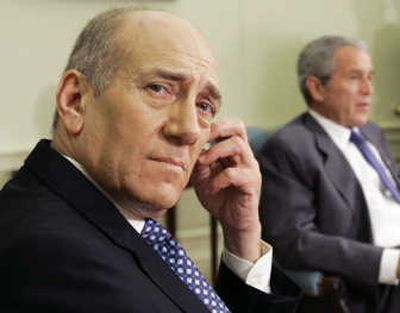Bush, Olmert back Abbas

WASHINGTON – President Bush and Israeli Prime Minister Ehud Olmert agreed Tuesday on a strategy to prop up the embattled Palestinian government of Mahmoud Abbas with financial aid, eased travel restrictions, moral support and peace talks as they struggled to counter the Hamas takeover of the Gaza Strip.
Appearing together at the White House just days after bloody street fighting ripped the Palestinian territories into rival camps, Bush and Olmert gave unequivocal backing to Abbas, repeatedly calling him the “president of all the Palestinians” despite the division on the ground. Olmert pledged to meet with Abbas and help “suffering Palestinians” through the crisis.
“He has spoken out for moderation,” Bush said of Abbas, who dismissed the Hamas prime minister and formed an emergency government. “He is a voice that is a reasonable voice amongst the extremists in your neighborhood.” Bush said the joint U.S.-Israeli approach would be to build up Abbas and his more moderate Fatah party so they “will be strengthened to the point where they can lead the Palestinians in a different direction, with a different hope.”
As part of the strategy, Olmert agreed to seek Cabinet approval in principle for the release of tax money collected by Israel authorities on behalf of the Palestinians, adding to the infusion of funds already on the way to Abbas from the United States and Europe, which lifted their embargo on direct aid, according to U.S. officials. After lunch with Bush, Olmert told Israeli reporters that he would also take “more far-reaching” steps in removing West Bank checkpoints, loosening travel restrictions and aiding Abbas’ security forces.
“Like you,” Olmert said at Bush’s side in the Oval Office, “I want to strengthen the moderates and cooperate with President Abu Mazen,” as Abbas is commonly known. “I am going to make every possible effort to cooperate with him and to move forward.” But Olmert emphasized that “a prerequisite for any major development in the future” would be a more serious effort by Abbas to “fight terror in a most effective way.”
And Bush rejected suggestions by Syria that he participate in talks between Jerusalem and Damascus aimed at settling regional tensions. “If the prime minister wants to negotiate with Syria,” Bush said, “he doesn’t need me to mediate.”